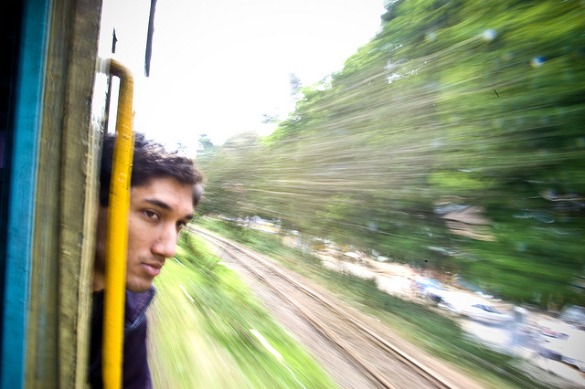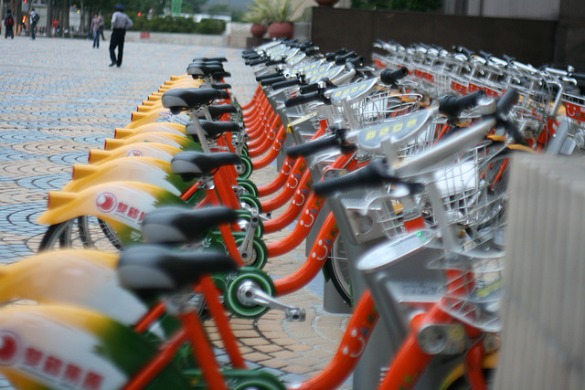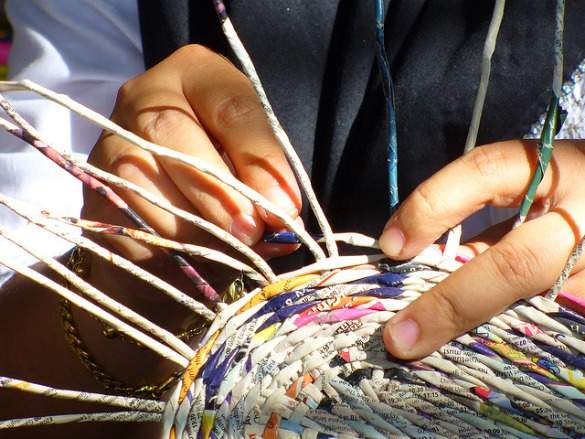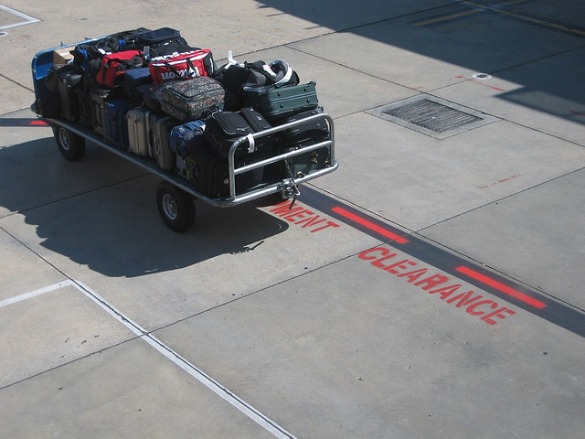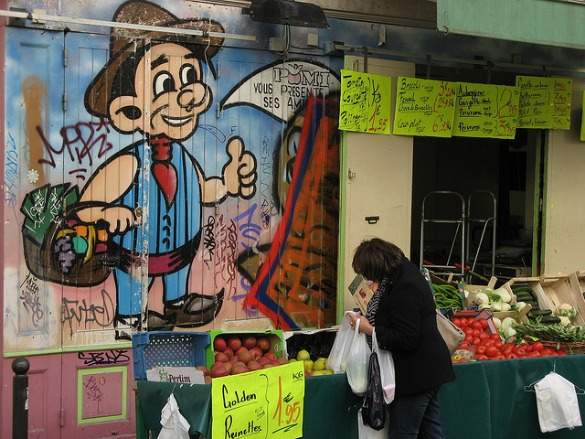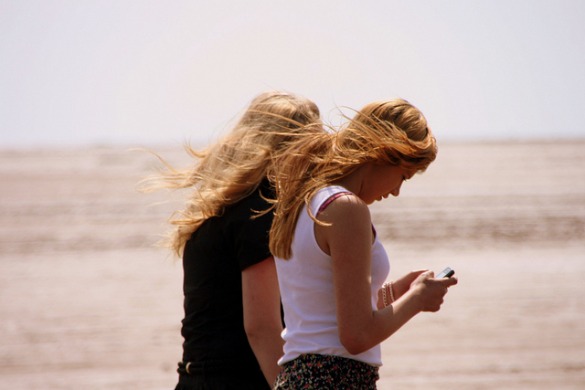Our “Sustainable Travel” series is sponsored by Global Basecamps. Global Basecamps is specialty travel company that helps independent travelers research and book locally owned boutique hotels, off-the-beaten path lodges and multi-day excursions all over the world. Whether hiking the Inca Trail, experiencing a traditional Japanese Ryokan, or relaxing on the beaches of Thailand, Global Basecamps specializes in designing completely customized itineraries to meet each travelers specific priorities and match their travel style.
Traveling green doesn’t mean you have to sleep in a tent, volunteer to save the sea turtles, and forgo all indulgences. Nor do you have to shell out big bucks for an eco-luxury hotel with organic cotton sheets. No matter what kind of trip you’re going on, there are plenty of affordable ways to reduce your environmental impact—and most of them will even enhance your travel experience.

Consider alternatives to flying
Of course, air travel is the fastest way to get to faraway lands. Unfortunately, it is also the single most environmentally harmful mode of transportation available to travelers. Airplane emissions are more detrimental to the ozone layer than those from ground transport, partly because the pollution simply occurs higher up in the atmosphere. You can calculate your own air travel carbon footprint here.
These facts aren’t meant to make you feel guilty about your upcoming trip to Asia. Air travel provides a remarkable opportunity—perhaps one we shouldn’t take for granted. One way to reduce your impact is to take longer, less frequent trips. Rather than jetting around the world in a whirlwind tour, why not stay in one place until you’re living like a local? You’ll use up less jet fuel and have a deeper experience.
Another way to approach the issue is to look closer to home for your adventures. The area around where you live may seem a bit boring at times, but with a little research, you’re bound to find some kind of cultural or natural attraction that’s close enough to travel by bike, bus, train, or car. If you keep your mind open, you could discover something in the next county over that’s just as exhilarating as something you’ve experienced halfway across the world.
>> Read about the seven best American train trips under $100
Eat local
You’ve heard the hype about local food. But it’s more than a trendy phrase being thrown around at hip new restaurants. It’s an approach that not only reduces pollution and carbon emissions (from transporting food long distances), but supports local economies as well. It can also mean the difference between having an authentic travel experience and feeling like an ignorant tourist.
Just because you are on a tropical island, don’t assume that all of the seafood and fruit you see on menus and shelves are from the immediate area. When in doubt, ask where the food came from. Having this simple conversation with your server could lead you to a dish made with the freshest, most delicious ingredients in town.
Culinary-minded travel doesn’t mean you have to spend a lot on food. For affordable access to local delicacies, visit farmer’s markets—or even better, go directly to the farms or places where food is made. Seeing how the cows are milked and where the curds are separated will only enhance the taste of that cheese you’re enjoying.
If you are traveling around the United States or Canada, the Eat Well Guide is a great resource for tracking down sustainable food options.
>> Find out what to eat – and when – around the world or sample 11 delicious and local street foods
Drink local
Don’t let the local food philosophy end with dinner. If you’re going out for drinks afterward, remember that all those bottles and their alluring contents came from somewhere. It’s best for the environment (and your quest for unique experiences!) if they come from a nearby microbrewery, distillery, or vineyard.
Like food, wine and beer can become a driving force in your trip. Head straight to a local brewery or winery, and you’ll often be able to take advantage of free samples and learn more about how the beverages are made. If you’re going on a tour of wine country, look into bicycle or walking tours: they’ll keep you safer and let you take in the scenery—and drinks—at a slower pace.
>> Raise a glass to eight famous local drinks to try – besides beer and wine
Reduce waste at hotels
Have you ever taken a longer shower, left the lights on, or cranked up the air conditioning in a hotel room? It’s all too easy to overindulge on energy and resources, especially when away from home. Staying in a hotel, you get that delightfully anonymous feeling that almost wipes away your accountability to anyone.
When you think about it, of course, responsible behavior matters just as much in a hotel as it does anyplace else. And when you’re a guest in a foreign land, respecting the local resources becomes especially important. Just keep that idea in mind, and you won’t be likely to use up water and electricity with such reckless abandon.
Thankfully, many hotels now give you the option of reusing your towels and sheets during your stay, rather than having them washed every day. To find hotels that do even more for the environment, pay attention to the eco-friendly certifications when using directories like Travelocity.
>> Read the beginner’s guide to traveling green
Learn public transportation systems
It might not be the most luxurious way to get around, but a crowded bus or train can offer some of the best people-watching material on your trip. Plus, everything from buying tickets to finding a seat to knowing when to get off can become an adventure. And who knows what else you’ll discover: lively performances, underground art, fascinating technology, a new perspective on geography?
Learning a complex public transportation system, while not always easy, is almost always the cheapest way to get around. Besides, you’ll feel like a local when you triumphantly get off at the correct stop. The best part is, you’ll be saving energy by using the publicly shared system.
>> Discover seven unique modes of transport in Asia and see photos of the quirkiest public transit systems in the world
Rent bikes
The bicycle is the world’s most efficient vehicle—it beats walking because you can cover more ground using fewer calories. It also happens to be one of the best ways to explore a city or a landscape. Since you’re completely setting your own pace, you can make a million stops on the side of the road to take photos, or zoom through the countryside with the wind in your hair.
Seek out bike rentals, bike sharing programs, or bike tours wherever you go. If you’re concerned about safety, maybe you should plan your next trip to one of these bicycle friendly cities. Or if you’re really hard core and plan to bike all the way to your destination, prepare yourself using resources from organizations such as the Adventure Cycling Association.
>> Read about renting a bike in Amsterdam
Bring home meaningful gifts
Rather than buying plastic key chains and t-shirts made in China (when you’re actually in Brazil), why not get some more meaningful souvenirs? Picking out special items at craft fairs, antiques markets, farmer’s markets, and other places that sell locally sourced products can add cultural depth to your trip. Knowing the story behind how something was made or where it came from makes it that much more interesting to bring home.
Even better, you could learn some of the basics directly from an artisan. By taking a lesson, you would be supporting an independent business owner, and at the same time, getting hands-on insight into the local culture. For some examples of literally handmade travel experiences around the world, see this slideshow.
>> Find out what you need to know about shopping in markets in Latin America
Pack light
Vehicles have to go through more fuel in order to carry heavier loads. By simply bringing less stuff, you can help make your trips on airplanes, public transportation, and cars more energy efficient. As an extra incentive, it will help you cut down on those luggage fees that airlines charge nowadays.
If you pack lighter, you will also be more inclined to walk or take public transportation to get around, rather than hailing a taxi every time you have to move your suitcase.
The weight factor is another thing to keep in mind when buying gifts and souvenirs. Opt for, say, a jar of jam instead of a bottle of wine, a pillowcase rather than a blanket; and you’ll avoid putting an extra burden on your back and the ozone layer.
>> Learn how to travel very lightly
Don’t eat out for every meal
Vacation is the perfect time to indulge in restaurant meals. But chances are, you will start to get sick of the constant overeating and overpaying. Besides, eating out usually generates more waste than home cooking does.
If you can, stay someplace with kitchen amenities for part of your trip, so you can take a break from restaurants. Not only will you save money, but tracking down ingredients at a neighborhood grocery store or market will also give you an insider’s perspective that you would never uncover while eating at touristy restaurants.
>> Read about the best food markets in the world
Turn off your smartphone
The more you use personal devices, the more you’ll have to charge them, and the more you’ll have to worry about losing them. Asking a local for directions or dinner recommendations will be more stimulating than staring at some app on your phone. And playing cards with your fellow travelers will make for better memories than playing online word games with your friends back at home.
There are some worthwhile travel apps you may benefit from downloading before your trip, but keep your screen time to a minimum. Simply turning off your phone is the surest way to avoid wasting battery power and missing out on the real action.
>> Ditch the smartphone and the guidebook! Check out these alternative trip planning resources
Contact Global Basecamps to enquire about this or other trips.
Photos by: Clint Tseng, Laura Padgett, Tristan Kenney, Fang Guo, Richard Giles, Richard Masoner, The Advocacy Project, Thomas Ashelford, Suvodeb Banerjee, comedy_nose
